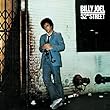 By Daniel Garrett
By Daniel Garrett
Billy Joel, 52nd Street
Produced by Phil Ramone
Columbia Records, 1978
Self-indulgent debauchery is the subject of “Big Shot,” one of the many popular songs by New York musician and acclaimed songwriter Billy Joel (William Martin Joel), the Bronx-born boy who grew up on Long Island and who may be the link between traditional American songs by men such as the Gershwin brothers, Duke Ellington, and Cole Porter on one hand, and the rock ‘n’ roll of Chuck Berry, Paul McCartney, and Elton John on the other. Billy Joel, the mother-encouraged son of a classical pianist father, has produced work with a sense of story and theater, but also a brashness of attitude and intensity that constitute self-expression. Some of Joel’s early albums are Cold Spring Harbor released in 1970, and Piano Man, Streetlife Serenade, Turnstiles, and The Stranger; and Joel’s calling card was “Piano Man,” but the album 52nd Street is a nice portrait of Joel’s protean and promising talent, with Glass Houses and An Innocent Man to follow. On 52nd Street, Billy Joel’s song “Big Shot” captures the spirit of the times, the addiction to expensive but tawdry glamour and the condescension it inspired. “They were all impressed with your Halston dress and the people that you knew at Elaine’s, and the story of your latest success kept them so entertained,” he sings, before confirming for the party girl that she does not want to learn what she has forgotten of the rest of the night. He even uses an Italian accent to speak to the girl, part of a comic takedown.
Billy Joel claims that tenderness is more common than truth in his downbeat, string-laden ballad “Honesty,” which he sings with a full-throated intensity that verges on bombast, although the simplicity of the theme, the actual necessity of truth, justifies the expression of passion. Paul McCartney’s influence is perceptible in the piano arrangement in the story-song “My Life,” about the sudden shifts, the instability, in American lives as well as the quest for individuality (there is a direct relationship between the quest and the instability; and the song’s observations are funny). Billy Joel had seen the Beatles on “The Ed Sullivan Show,” and been inspired by McCartney, Lennon, Harrison, and Starr for Joel’s own music career, which has produced popular songs such as “Only the Good Die Young” and “New York State of Mind,” as well as “Tell Her About It,” “Uptown Girl,” and “We Didn’t Start the Fire.” Billy Joel also admired singer-pianist Ray Charles, and would name his daughter Alexa Ray (her mother is model Christie Brinkley). It is not only classic rock music, but jazz and traditional European conservatory music that one hears traces of in Joel’s work, as in “Zanzibar,” which considers a performer and club audience—the song’s arrangement, rising and falling, reminds one of live piano music, of the kind of shifts in mood that take place in a music club. The multiplicity of Joel’s influences and what he has made of them distinguish him.
A cutting woman and her male victim are the subject of “Stiletto,” which has a complex rhythm, and in which Billy Joel sings, “She says she needs affection while she searches for the vein.” It’s attractive, startling, fun—humor, even wit, balances the earnest quality in Joel. (I wonder if Michael Jackson heard this song, “Stiletto”; I imagine he would have liked it.) Joel’s voice is at its smoothest in the romantic tribute, “Rosalinda’s Eyes”—the narrator mentions being in a Puerto Rican band and thinking of Havana, one of those songs that captures a multicultural New York atmosphere. “Half A Mile Away,” about friendship, women, lies, escape, and music, is a piece in which story and melody are more important than aggression or rhythm, although there is a hint of gospel style, the kind of pleasing thing that makes some think that Joel is more entertainer than natural rocker—what it really means is that he has genuine gifts, something more than attitude to offer. Yet, Joel would be recognized for his contributions to rock at various time, such as by winning in 1981 a Grammy for best male rock vocal performance, and—years after a career milestone with 1994’s River of Dreams—by being inducted in 1999 by Ray Charles into the Rock and Roll Hall of Fame.
Billy Joel is an artist and an entertainer of imagination. Joel uses a deep voice and the rhythm is like a cinema theme in 52nd Street’s “Until the Night,” which could be a Mexican ballad from a western—or a lost, slightly transposed doo-wop piece. It’s interesting to listen to and think about—a mid-tempo ballad with a romantic theme, about remembering and looking forward, it has nice harmonies, and one even thinks of classical music. (In his later years, Joel would make known his composition of songs in the classical tradition with the album Fantasies & Delusions.) There is really nice horn-playing in the song “52nd Street” and Joel’s vocal inflections seem intent on articulating another side of the city.
Daniel Garrett, a graduate of the New School for Social Research, and the principal organizer of the Cultural Politics Discussion Group at Poets House, is a writer whose work has appeared in The African, All About Jazz, American Book Review, Art & Antiques, The Audubon Activist, Black Film Review, Changing Men, Cinetext, Contact II, Film International, The Humanist, Hyphen, Illuminations, Muse Apprentice Guild, Option, Pop Matters, Quarterly Black Review of Books, Rain Taxi, Red River Review, Review of Contemporary Fiction, Wax Poetics, and World Literature Today. Daniel Garrett has written extensively about international film for Offscreen, and comprehensive commentary on music for The Compulsive Reader. He has an internet log, “The Art Notes of a Solitary Walker,” focused on visual art. He has written a novel, A Stranger on Earth.